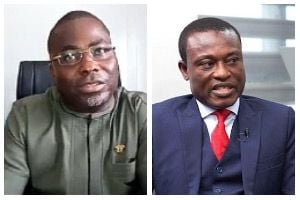Paragraph 1: Introduction and Background
Charles Cromwell Nanabanyin Onuawonto Bissue, former Secretary of the Inter-Ministerial Committee on Illegal Mining (IMCIM), finds himself embroiled in a legal battle against the Office of the Special Prosecutor (OSP) over allegations of corruption and misuse of public office. The OSP has formally charged Mr. Bissue and another individual, Andy Thomas Owusu, with multiple offenses related to alleged illicit financial transactions during Mr. Bissue’s tenure at the IMCIM. These charges stem from a broader investigation into illegal mining activities and the potential exploitation of regulatory processes for personal gain.
Paragraph 2: Details of the Charges
The OSP’s charges against Mr. Bissue and Mr. Owusu were filed at the Accra High Court on April 28th. Mr. Bissue faces nine counts, primarily focusing on "using public office for profit" and "corruption by a public officer" under the Criminal Offences Act, 1960. Mr. Owusu is charged with six related counts. The core accusation revolves around allegations that Mr. Bissue accepted cash payments in exchange for expediting the renewal of mining licenses without adhering to proper documentation procedures. The OSP contends that these actions represent a clear abuse of Mr. Bissue’s position and a violation of the public trust.
Paragraph 3: Specific Instances of Alleged Misconduct
The charge sheet specifies several instances of alleged misconduct. On January 22, 2019, Mr. Bissue allegedly received GHS 15,000 from Benjamin Adjapong through Andy Thomas Owusu. On January 30, 2019, he allegedly received another GHS 10,000. The OSP claims both payments were made to incentivize Mr. Bissue to improperly accelerate the renewal of an expired mining license for ORR Resources Enterprise, bypassing the standard regulatory requirements and documentation. These specific instances form the basis of the OSP’s case against Mr. Bissue and Mr. Owusu.
Paragraph 4: Mr. Bissue’s Vehement Denial
In response to the charges, Mr. Bissue issued a strong denial of any wrongdoing. In his statement released on April 29th, he unequivocally asserted that he has consistently complied with both the legal and ethical obligations of his former office. He characterized the allegations as baseless and pledged to vigorously defend himself through the legal process. Mr. Bissue welcomed the OSP’s decision to finally bring the case to court after a protracted period of investigation, spanning over five years. This extended timeframe forms part of his defense strategy.
Paragraph 5: Call for Transparency and the Undoctored Video
A key component of Mr. Bissue’s defense involves his call for full transparency from the OSP. He insists the OSP submit the complete, unedited, and unaltered version of a video documentary referenced in their proceedings. Mr. Bissue argues that this video is central to understanding the context of the alleged events and that selective editing or manipulation could distort the truth. He frames this request as a matter of public interest, emphasizing that Ghanaians deserve access to all the facts without external narratives or interpretations influencing their understanding.
Paragraph 6: Implications and Looking Ahead
This case carries significant implications for the ongoing fight against corruption in Ghana’s mining sector. The outcome will impact public perception of the government’s commitment to tackling corruption and ensuring accountability, particularly within influential positions. Mr. Bissue’s demand for the unedited video adds another layer of complexity, raising questions about the integrity of the evidence presented. As the trial unfolds, it will be crucial to examine all the evidence presented by both sides to arrive at a just and impartial verdict. The case will also likely set a precedent for future prosecutions related to corruption within the mining industry.














